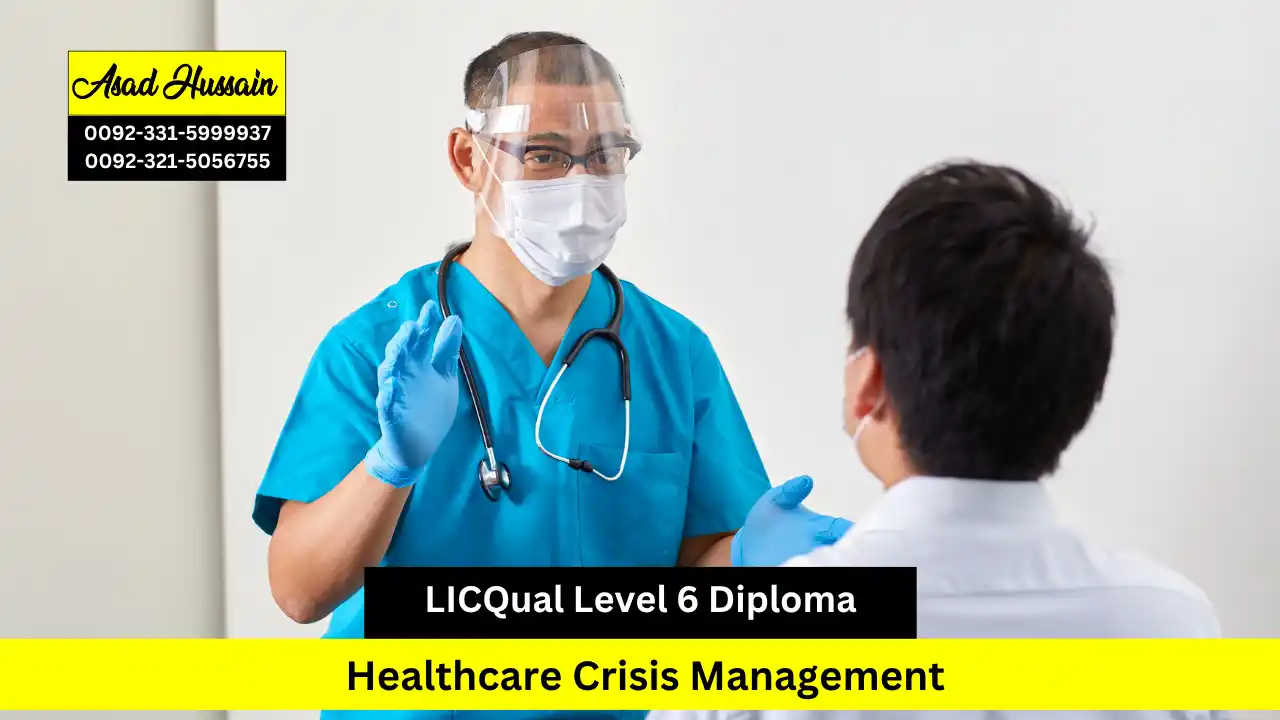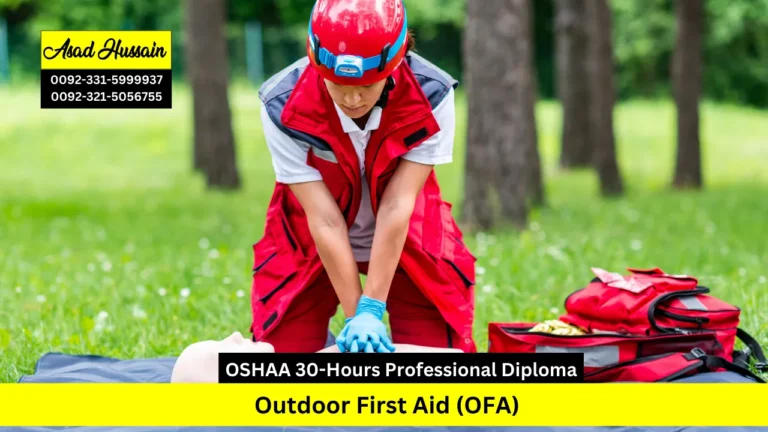The LICQual Level 6 Diploma in Healthcare Crisis Management is a globally recognised qualification designed for healthcare professionals, leaders, and managers who aspire to effectively manage and respond to crises within healthcare environments. In an era marked by global health emergencies, pandemics, and operational disruptions, the ability to plan, coordinate, and execute strategic crisis responses is essential. This advanced diploma equips learners with the critical knowledge and leadership skills required to handle healthcare crises with resilience, precision, and confidence.
LICQual Level 6 Diploma in Healthcare Crisis Management focuses on developing a deep understanding of risk assessment, emergency preparedness, and rapid decision-making in high-pressure healthcare settings. Learners will explore real-world strategies and frameworks used to mitigate risks, maintain patient safety, and sustain healthcare operations during emergencies. The qualification emphasises proactive crisis planning and post-crisis recovery management — key skills needed to ensure continuity of care and organisational stability.
The LICQual Level 6 Diploma in Healthcare Crisis Management, learners will gain expertise in crisis communication, emergency leadership, and resource allocation during critical situations. They will learn to coordinate multidisciplinary teams, manage limited healthcare resources, and implement evidence-based crisis response strategies that adhere to national and international healthcare standards.
The course also addresses ethical and legal dimensions of healthcare crisis management, empowering professionals to make informed, compliant, and compassionate decisions during emergencies. By studying real-world case studies and simulated crisis scenarios, learners will develop practical, action-oriented capabilities that enhance both individual and organisational crisis resilience.
This qualification is ideal for healthcare managers, emergency response coordinators, policy makers, and administrators seeking to strengthen their crisis management and leadership skills. It also supports clinicians and frontline healthcare professionals in gaining strategic insight into crisis planning and operational recovery.
The LICQual Level 6 Diploma in Healthcare Crisis Management, graduates will be equipped to lead effective healthcare crisis responses, ensuring organisational readiness and patient safety in the face of complex challenges. This qualification opens pathways to leadership roles in healthcare emergency management, hospital administration, and public health resilience — empowering professionals to protect lives, maintain quality care, and strengthen healthcare systems globally.
Program Highlights
Mandatory Units
- Principles of Healthcare Crisis Management
- Risk Assessment and Emergency Planning
- Leadership and Decision-Making in Crises
- Communication and Stakeholder Management
- Healthcare Operations and Resource Management in Crises
- Evaluation, Learning, and Continuous Improvement
The LICQual Level 6 Diploma in Healthcare Crisis Management is designed for healthcare professionals, leaders, and administrators aiming to strengthen their expertise in crisis response, emergency preparedness, and healthcare system resilience. This qualification welcomes learners from diverse healthcare and management backgrounds who seek to enhance their ability to lead effectively during complex healthcare emergencies. The entry requirements ensure that learners possess the foundational knowledge, experience, and communication skills necessary to excel in this advanced and highly specialized program.
Age Requirements
• Learners must be at least 18 years of age or above at the time of enrollment.
• Applicants should demonstrate professional maturity, decision-making capability, and a strong sense of responsibility toward crisis leadership in healthcare environments.
Educational Requirements
• A Level 5 qualification in healthcare, public health, management, or a related discipline is preferred.
• Candidates holding equivalent academic qualifications or professional certifications relevant to healthcare or emergency management will also be considered.
• Applicants without formal academic credentials but with substantial industry or field experience in healthcare operations, crisis management, or emergency response may be accepted on an individual basis.
Professional Experience
• Ideally, learners should have at least two years of professional experience in healthcare, emergency response, hospital administration, or related management roles.
• Individuals currently employed in hospitals, healthcare organizations, government health departments, or NGOs involved in crisis response are strongly encouraged to apply.
• Prior experience in managing health emergencies, risk mitigation, or contingency planning will provide a strong foundation for understanding and applying the course’s practical components.
English Language Proficiency
• As the course is delivered entirely in English, learners must demonstrate sufficient proficiency in reading, writing, and verbal communication.
• Non-native English speakers may be required to submit evidence of English language competence, such as IELTS or an equivalent qualification.
• Applicants who have previously studied or worked in an English-speaking environment may also meet this requirement through relevant experience.
Learners who do not fully meet these criteria may still be considered based on their professional achievements, leadership potential, and commitment to developing crisis management expertise. For individuals seeking to build their foundational understanding before enrolling in this diploma, the LICQual Level 5 Diploma in Healthcare Management is a highly recommended related course. It provides an excellent introduction to healthcare operations, leadership, and risk management principles that serve as a strong precursor to mastering advanced crisis management strategies.
The LICQual Level 6 Diploma in Healthcare Crisis Management equips learners with the essential knowledge, leadership skills, and strategic capabilities required to effectively manage healthcare crises and emergencies. Through this qualification, learners will gain a deep understanding of crisis preparedness, risk mitigation, and response coordination within healthcare systems. Each unit focuses on building both theoretical and practical competencies to help professionals lead with confidence, make data-driven decisions, and ensure the continuity of care during challenging situations.
Upon successful completion of this diploma, learners will be able to design, implement, and evaluate healthcare crisis management frameworks aligned with international standards. They will also develop the ability to collaborate with multidisciplinary teams, optimise healthcare operations under pressure, and contribute to building resilient healthcare institutions capable of responding effectively to emergencies.
Principles of Healthcare Crisis Management
• Understand the fundamental principles, models, and frameworks of healthcare crisis management and their relevance in diverse healthcare contexts.
• Identify the different types of healthcare crises, including pandemics, natural disasters, and operational failures, and analyse their systemic impacts.
• Apply theoretical and practical knowledge to develop comprehensive crisis management strategies for healthcare organisations.
• Demonstrate awareness of ethical, legal, and governance considerations in managing healthcare emergencies.
• Evaluate the importance of preparedness and resilience-building in maintaining healthcare system stability during crises.
Risk Assessment and Emergency Planning
• Conduct detailed risk assessments to identify potential threats and vulnerabilities within healthcare operations.
• Develop effective emergency response and contingency plans that align with local, national, and international healthcare regulations.
• Apply analytical tools and methodologies for risk prioritisation and mitigation in healthcare crisis scenarios.
• Integrate data-driven decision-making in creating adaptable crisis response frameworks.
• Design monitoring systems to evaluate risk exposure and ensure continuous readiness in healthcare settings.
Leadership and Decision-Making in Crises
• Demonstrate leadership competencies essential for guiding healthcare teams through high-pressure and uncertain environments.
• Apply critical thinking and evidence-based approaches to make timely and ethical decisions during crises.
• Lead multidisciplinary teams effectively, ensuring coordination, motivation, and accountability throughout crisis situations.
• Analyse leadership challenges in crisis contexts and develop strategies to enhance organisational resilience.
• Implement adaptive leadership techniques to manage evolving healthcare emergencies efficiently.
Communication and Stakeholder Management
• Develop advanced communication strategies for internal and external stakeholders during healthcare crises.
• Apply principles of transparent and ethical communication to maintain public trust and organisational credibility.
• Manage relationships with government agencies, healthcare professionals, patients, and media during emergency response operations.
• Demonstrate conflict resolution and negotiation skills to address stakeholder concerns effectively.
• Utilise digital communication tools and technologies to enhance information sharing and crisis coordination.
Healthcare Operations and Resource Management in Crises
• Evaluate operational challenges in healthcare systems during emergencies and develop solutions to maintain service delivery.
• Apply principles of resource allocation, logistics, and supply chain management in crisis conditions.
• Coordinate workforce deployment, equipment management, and critical resource distribution effectively.
• Develop operational strategies that ensure continuity of care and patient safety under high-demand situations.
• Analyse case studies to assess operational effectiveness and resource optimisation in healthcare crises.
Evaluation, Learning, and Continuous Improvement
• Design and implement evaluation frameworks to assess the effectiveness of crisis management strategies.
• Identify lessons learned from healthcare crisis responses and apply them to future preparedness plans.
• Develop continuous improvement mechanisms for healthcare organisations to enhance resilience and adaptability.
• Apply quality assurance principles to strengthen response capacity and organisational learning.
• Produce detailed post-crisis reports and recommendations that promote innovation and sustainable improvement.
The LICQual Level 6 Diploma in Healthcare Crisis Management, learners will have acquired the ability to lead healthcare organisations through emergencies with strategic foresight, ethical integrity, and operational excellence. They will emerge as capable crisis managers who can anticipate risks, manage resources effectively, and foster a culture of preparedness, resilience, and continuous improvement across healthcare systems.
The LICQual Level 6 Diploma in Healthcare Crisis Management is a globally recognized qualification designed for healthcare professionals who aim to develop expertise in crisis preparedness, emergency response, and organizational resilience within healthcare systems. In an era marked by pandemics, natural disasters, and critical healthcare disruptions, crisis management has become an essential leadership skill. This program provides learners with advanced knowledge, analytical tools, and strategic management capabilities to effectively anticipate, plan, and respond to crises while ensuring patient safety and operational continuity across healthcare environments.
Healthcare Leaders and Managers
• Professionals currently in or aspiring to leadership roles within hospitals, clinics, and healthcare organizations.
• Managers responsible for developing and implementing crisis preparedness and response strategies.
• Individuals aiming to strengthen their leadership and decision-making skills in high-pressure healthcare environments.
• Leaders focused on improving healthcare delivery through effective risk management and emergency coordination.
• Administrators striving to build resilient healthcare systems that can withstand crises and sustain quality care delivery.
Healthcare Professionals and Practitioners
• Doctors, nurses, and allied health professionals involved in clinical operations during emergencies and healthcare crises.
• Practitioners seeking to enhance their understanding of crisis protocols, emergency planning, and healthcare resilience.
• Professionals dedicated to maintaining patient safety, ethical care, and operational integrity under crisis conditions.
• Clinicians aiming to integrate evidence-based crisis management practices into clinical and organizational processes.
• Learners striving to enhance their practical competence in emergency response coordination and disaster risk reduction.
Risk and Emergency Management Officers
• Professionals responsible for designing, implementing, and managing crisis management and emergency preparedness programs.
• Individuals tasked with conducting risk assessments, developing contingency plans, and leading emergency response teams.
• Managers specializing in healthcare risk management, operational continuity, and emergency recovery strategies.
• Learners focusing on healthcare crisis governance, disaster resilience, and response optimization.
• Leaders committed to ensuring organizational readiness and safety through structured crisis management systems.
Policy Makers and Healthcare Administrators
• Policy makers and administrators engaged in shaping healthcare crisis management policies and governance frameworks.
• Professionals integrating emergency preparedness and public health safety protocols into healthcare strategies.
• Individuals responsible for aligning healthcare institutions with national and international crisis management standards.
• Administrators overseeing emergency departments, disaster response units, or crisis coordination centers.
• Leaders committed to strengthening healthcare governance systems through evidence-based crisis policies and reforms.
Supervisors and Departmental Heads
• Supervisors managing teams and ensuring adherence to emergency response protocols during healthcare crises.
• Departmental heads responsible for implementing risk assessments, safety policies, and incident response plans.
• Professionals developing internal monitoring systems for crisis preparedness and operational sustainability.
• Managers conducting drills, simulations, and reviews to ensure staff readiness and procedural efficiency.
• Leaders fostering a culture of preparedness, accountability, and resilience within healthcare departments.
Career-Focused Learners and Future Healthcare Crisis Managers
• Individuals aspiring to build careers in healthcare emergency management, disaster preparedness, or crisis coordination.
• Learners preparing for leadership positions in crisis management, healthcare risk mitigation, and policy development.
• Professionals aiming to advance in roles related to healthcare resilience, emergency planning, or organizational recovery.
• Career-driven individuals motivated to apply global best practices in healthcare crisis and disaster management.
• Learners seeking to become influential leaders capable of leading healthcare institutions through complex emergencies.
The LICQual Level 6 Diploma in Healthcare Crisis Management is ideal for professionals dedicated to enhancing healthcare safety, preparedness, and operational stability during emergencies. Graduates will gain the expertise to design, implement, and lead crisis management frameworks that meet international healthcare standards. This qualification opens doors to senior roles in healthcare administration, emergency management, and strategic leadership — empowering professionals to respond effectively to crises, protect patient well-being, and strengthen healthcare system resilience worldwide.







